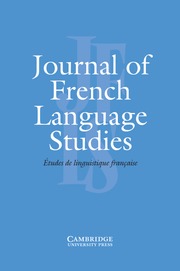Article contents
Lexical borrowings in French: Anglicisms as a separate phenomenon
Published online by Cambridge University Press: 20 July 2010
Abstract
This study examines the occurrences of new lexical borrowings in a French newspaper corpus to determine whether the phenomenon of English lexical borrowings (Anglicisms) is different than the phenomenon of non-English borrowings. Based on a search for all occurrences of new lexical borrowings in a corpus, it is found that new Anglicisms outnumber all other new borrowings combined. When cross-checking these results against the online archives of another French newspaper, it is found that the Anglicisms are more productive than borrowings with similar frequencies from other languages. Additionally, qualitative findings show that new Anglicisms are more likely than other borrowings to be integrated into the French lexicon. In French, Anglicisms are employed for different reasons than lexical borrowings from other languages.
Information
- Type
- Articles
- Information
- Copyright
- Copyright © Cambridge University Press 2010
References
REFERENCES
- 8
- Cited by

